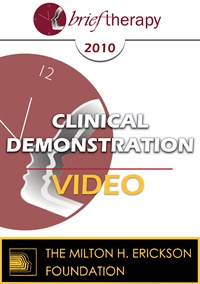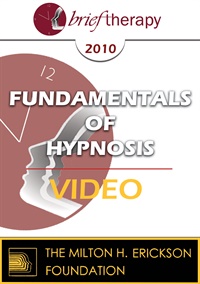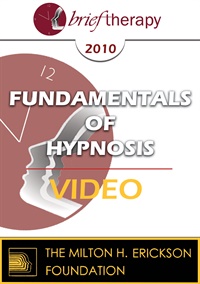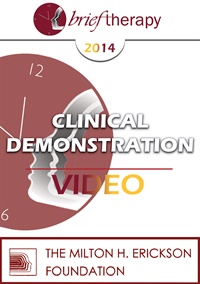
- Average Rating:
- Not yet rated
- Topic Areas:
- Short Courses | Brief Therapy | Children and Adolescent Therapy | Anxiety | Ericksonian Hypnosis and Therapy Techniques
- Categories:
- Brief Therapy Conference | Brief Therapy Conference 2008
- Faculty:
- Lynn Lyons, LICSW
- Duration:
- 1:16:09
- Format:
- Audio Only
- Original Program Date:
- Dec 11, 2008
- Short Description:
- Excessive anxiety in childhood is a significant predictor of eventual comorbid depression and other conditions. This presentation will identify the cognitive processes and coping strategies that help create a cycle of anxiety, psychosocial isolation, and depression in anxious children and families. Attention will be given to the development of specific, empirically supported Ericksonian strategies which can help shift the anxious individual and family toward malleability, creativity and adaptability.
- Price:
- $15.00 - Base Price
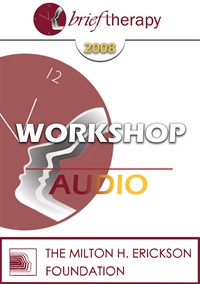
- Average Rating:
- Not yet rated
- Topic Areas:
- Workshops | Seeding | Brief Therapy | Ericksonian Hypnosis and Therapy Techniques | Psychotherapy
- Categories:
- Brief Therapy Conference | Brief Therapy Conference 2008
- Faculty:
- Jeffrey Zeig, PhD
- Duration:
- 2:24:19
- Format:
- Audio Only
- Original Program Date:
- Dec 14, 2008
- Short Description:
- In the literature, music and drama, artists often covertly foreshadow impending events. In social psychology there are myriad studies of priming, an effect by which the accessibility of a future target is increased by the presentation of an earlier cue. Priming effects illuminate important facets of interpersonal responsiveness. Milton Erickson was the first therapist to seed future ideas in the course of strategic therapy and hypnosis. Seeding is an important concept that can increase the effectiveness of interventions regardless of the technique that will be used. We will learn to harness seeding methods through lecture, demonstration and practice.
- Price:
- $15.00 - Base Price
- Average Rating:
- Not yet rated
- Topic Areas:
- Clinical Demonstrations | Trance | Utilization | Generative Psychotherapy | Somatic Experiences | Ericksonian Hypnosis and Therapy Techniques | Brief Therapy
- Categories:
- Brief Therapy Conference | Brief Therapy Conference 2010
- Faculty:
- Stephen Gilligan, PhD
- Course Levels:
- Master Degree or Higher in Health-Related Field
- Duration:
- 50:14
- Format:
- Audio and Video
- Original Program Date:
- Dec 11, 2010
- Short Description:
- This session will illustrate the Ericksonian utilization principle, which states that under proper conditions, a problem may easily transform into a solution. The demonstration will show how to develop such conditions via the experience of “generative trance,” such that positive shifts in a person’s somatic, cognitive and field experience lead to positive changes.
- Price:
-
Sale is $29.00
price reduced from Base Price - $59.00
- Average Rating:
- Not yet rated
- Topic Areas:
- Hypnosis | Fundamentals of Hypnosis | Ericksonian Hypnosis and Therapy Techniques | Treatment Planning
- Categories:
- Brief Therapy Conference | Brief Therapy Conference 2010
- Faculty:
- Bill O'Hanlon, MS
- Course Levels:
- Master Degree or Higher in Health-Related Field
- Duration:
- 2:04:56
- Format:
- Audio and Video
- Original Program Date:
- Dec 10, 2010
- Short Description:
- In this session, you will learn a clear model that will allow you to rapidly conceptualize problems, sort them for appropriateness for hypnotic intervention, and create multiple interventions. You will also learn five delivery methods for interventions.
- Price:
- $29.00 - Base Price
- Average Rating:
- Not yet rated
- Topic Areas:
- Hypnosis | Hypnotherapy | Fundamentals of Hypnosis | Ericksonian Hypnosis and Therapy Techniques | Utilization
- Categories:
- Brief Therapy Conference | Brief Therapy Conference 2010
- Faculty:
- Stephen Gilligan, PhD
- Course Levels:
- Master Degree or Higher in Health-Related Field
- Duration:
- 2:15:55
- Format:
- Audio and Video
- Original Program Date:
- Dec 12, 2010
- Short Description:
- This workshop provides an overview of the Ericksonian theory of utilization and then explores through demonstration, clinical examples, and a brief group exercise how to incorporate a client's processes—positive and negative associations, positive goals, desired futures, ongoing behaviors--in both the induction and utilization parts of Ericksonian hypnotherapy.
- Price:
- $29.00 - Base Price
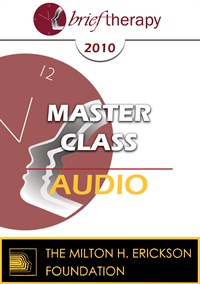
- Average Rating:
- Not yet rated
- Topic Areas:
- Hypnotherapy | Master Classes | Self-Relations | Ericksonian Hypnosis and Therapy Techniques | Psychotherapy
- Categories:
- Brief Therapy Conference | Brief Therapy Conference 2010
- Faculty:
- Jeffrey Zeig, PhD | Stephen Gilligan, PhD
- Duration:
- 2:38:40
- Format:
- Audio Only
- Original Program Date:
- Dec 13, 2010
- Short Description:
- Ericksonian hypnotherapy and the Self-Relations approach are experiential methods of change. In combination they can be synergistic. Psychotherapy is best when clients have a first hand experience of an alive therapeutic process. Such dynamic empowering experiences pave the way for dynamic understandings. Drs. Gilligan and Zeig will engage with each other and the participants to examine commonalities and differences in their work.
- Price:
- $15.00 - Base Price
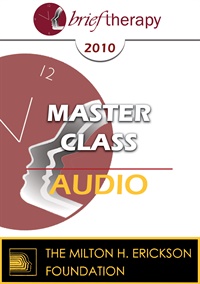
- Average Rating:
- Not yet rated
- Topic Areas:
- Master Classes | Ericksonian Hypnosis and Therapy Techniques | Self-Relations | Hypnotherapy | Psychotherapy
- Categories:
- Brief Therapy Conference | Brief Therapy Conference 2010
- Faculty:
- Stephen Gilligan, PhD | Jeffrey Zeig, PhD
- Duration:
- 2:44:28
- Format:
- Audio Only
- Original Program Date:
- Dec 13, 2010
- Short Description:
- Ericksonian hypnotherapy and the Self-Relations approach are experiential methods of change. In combination they can be synergistic. Psychotherapy is best when clients have a first hand experience of an alive therapeutic process. Such dynamic empowering experiences pave the way for dynamic understandings. Drs. Gilligan and Zeig will engage with each other and the participants to examine commonalities and differences in their work.
- Price:
- $15.00 - Base Price
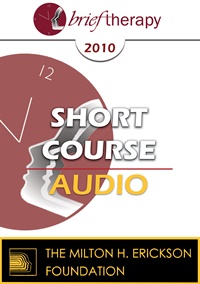
- Average Rating:
- Not yet rated
- Topic Areas:
- Anxiety | Short Courses | Brief Therapy | Ericksonian Hypnosis and Therapy Techniques
- Categories:
- Brief Therapy Conference | Brief Therapy Conference 2010
- Faculty:
- Joseph Dowling, MS, LPC
- Duration:
- 1:27:41
- Format:
- Audio Only
- Original Program Date:
- Dec 09, 2010
- Short Description:
- Milton H. Erickson, MD, understood that “the conscious (thinking) mind doesn’t do much of anything of much significance…while the unconscious mind is an infinite storehouse of dreams, potentials, and solutions…” This workshop will teach a brief, solution focused, strategic, and hypnotic approach to anxiety related disorders. Intellectualizing, analyzing, self-criticizing, WHY-ing and WHAT-IF-ing clients will be targeted as participants learn to employ Ericksonian interventions including solution-focused questions, strategic task assignments, and formal/conversational hypnosis via live demonstration, experiential exercise, and case studies.
- Price:
- $15.00 - Base Price
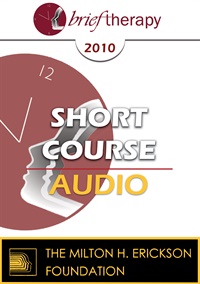
- Average Rating:
- Not yet rated
- Topic Areas:
- Hypnotherapy | Short Courses | Brief Therapy | Ericksonian Hypnosis and Therapy Techniques
- Categories:
- Brief Therapy Conference | Brief Therapy Conference 2010
- Faculty:
- Erika Chovanec, PhD
- Duration:
- 1:03:48
- Format:
- Audio Only
- Original Program Date:
- Dec 09, 2010
- Short Description:
- This workshop will introduce a holistic-motivational approach toward brief therapy, inspired by the work of Abraham Maslow. It will use lecture and demonstrations to show how hypnotherapy can aid in the utilization and encouragement of what Maslow would call Being Motivation and Metavalues in order to create lasting solutions. Participants will also learn specific forms of Ericksonian communication that may enhance Being Motivation and Metavalues.
- Price:
- $15.00 - Base Price
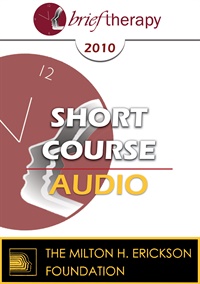
- Average Rating:
- Not yet rated
- Topic Areas:
- Psychotherapy | Short Courses | Ericksonian Psychotherapy | Ericksonian Hypnosis and Therapy Techniques
- Categories:
- Brief Therapy Conference | Brief Therapy Conference 2010
- Faculty:
- Maria Escalante de Smith, MA
- Duration:
- 1:27:11
- Format:
- Audio Only
- Original Program Date:
- Dec 09, 2010
- Short Description:
- Women who face unplanned pregnancies may experience a wide range of emotions and go through deep crises when they learn they are pregnant. In this workshop, the presenter will describe how brief Ericksonian interventions can help them explore possibilities and cope with their crises during unplanned pregnancy. Examples of quick interventions and conversational trance will be given as well. There will be references to the importance of hope and exercises for coming to terms with previous experience.
- Price:
- $15.00 - Base Price
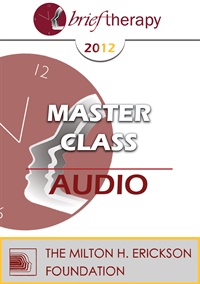
- Average Rating:
- Not yet rated
- Topic Areas:
- Master Classes | Brief Therapy | Experiential Therapy | Gestalt | Hypnosis | Hypnotherapy | Psychotherapy | Ericksonian Hypnosis and Therapy Techniques
- Categories:
- Brief Therapy Conference | Brief Therapy Conference 2012
- Faculty:
- Jeffrey Zeig, PhD | Erving Polster, PhD
- Duration:
- 2:44:44
- Format:
- Audio Only
- Original Program Date:
- Dec 10, 2012
- Short Description:
- Gestalt therapy and Ericksonian hypnotherapy are experiential methods of change. In combination they can be synergistic. Psychotherapy is best when clients have first-hand experience of an alive therapeutic process. Such dynamic empowering experiences pave the way for dynamic understandings. Drs. Polster and Zeig will engage with each other and participants to examine commonalities and differences in their work in this engaging all-day workshop.
- Price:
- $15.00 - Base Price
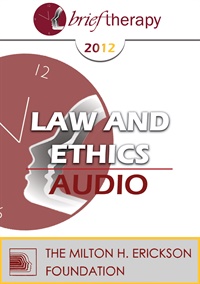
- Average Rating:
- Not yet rated
- Topic Areas:
- Master Classes | Brief Therapy | Experiential Therapy | Gestalt | Hypnosis | Ericksonian Hypnosis and Therapy Techniques | Hypnotherapy | Psychotherapy
- Categories:
- Brief Therapy Conference | Brief Therapy Conference 2012
- Faculty:
- Jeffrey Zeig, PhD | Erving Polster, PhD
- Duration:
- 2:40:44
- Format:
- Audio Only
- Original Program Date:
- Dec 10, 2012
- Short Description:
- Gestalt therapy and Ericksonian hypnotherapy are experiential methods of change. In combination they can be synergistic. Psychotherapy is best when clients have first-hand experience of an alive therapeutic process. Such dynamic empowering experiences pave the way for dynamic understandings. Drs. Polster and Zeig will engage with each other and participants to examine commonalities and differences in their work in this engaging all-day workshop.
- Price:
- $15.00 - Base Price
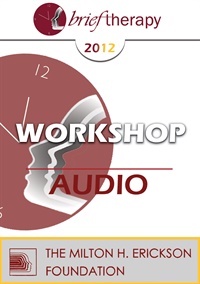
- Average Rating:
- Not yet rated
- Topic Areas:
- Couples Therapy | Workshops | Communication | Conflict | Ericksonian Hypnosis and Therapy Techniques | Interviewing | Motivation | Solution Oriented Approach
- Categories:
- Brief Therapy Conference | Brief Therapy Conference 2012 | Pioneers in Couples and Family Therapy
- Faculty:
- Michele Weiner-Davis, LCSW
- Duration:
- 2:25:13
- Format:
- Audio Only
- Original Program Date:
- Dec 08, 2012
- Short Description:
- This session presents a structured framework for working with one partner to effect change in the couple system. It explores clinical opportunities when only one partner engages in therapy, emphasizing goal orientation, behavior shifts, and communication patterns. Grounded in real cases, the approach encourages creative, actionable strategies to strengthen relationships—even when partners differ in readiness.
- Price:
- $15.00 - Base Price
- Average Rating:
- Not yet rated
- Topic Areas:
- Clinical Demonstrations | Utilization | Ericksonian Hypnosis and Therapy Techniques
- Categories:
- Brief Therapy Conference | Brief Therapy Conference 2014
- Faculty:
- Jeffrey Zeig, PhD
- Course Levels:
- Master Degree or Higher in Health-Related Field
- Duration:
- 55:39
- Format:
- Audio and Video
- Original Program Date:
- Dec 13, 2014
- Short Description:
- All of Milton Erickson’s cases are based in utilization. It is an “alchemical formula” of turning lead into gold. Utilization is not a technique; it is an orientation that the therapist assumes. Utilization is an orientation of sufficiency that is the opposite of psychological problems, which can be viewed as believed in insufficiencies.
- Price:
-
Sale is $29.00
price reduced from Base Price - $59.00
- Average Rating:
- Not yet rated
- Topic Areas:
- Clinical Demonstrations | Brief Therapy | Ericksonian Hypnosis and Therapy Techniques
- Categories:
- Brief Therapy Conference | Brief Therapy Conference 2014
- Faculty:
- Bill O'Hanlon, MS
- Course Levels:
- Master Degree or Higher in Health-Related Field
- Duration:
- 54:42
- Format:
- Audio and Video
- Original Program Date:
- Dec 13, 2014
- Short Description:
- This demonstration will show the use of a gentle brief therapy method that uses the best of client-centered therapy and Ericksonian methods to meet the person where he or she is and rapidly invite him or her into new possibilities.
- Price:
-
Sale is $29.00
price reduced from Base Price - $59.00
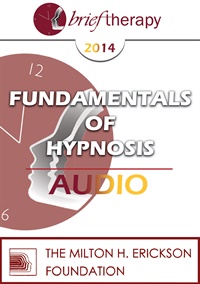
- Average Rating:
- Not yet rated
- Topic Areas:
- Hypnosis | Hypnotic Induction | Fundamentals of Hypnosis | Ericksonian Hypnosis and Therapy Techniques
- Categories:
- Brief Therapy Conference | Brief Therapy Conference 2014
- Faculty:
- Jeffrey Zeig, PhD
- Duration:
- 5:38:29
- Format:
- Audio Only
- Original Program Date:
- Dec 12, 2014
- Short Description:
- What is hypnosis? What is the Ericksonian difference? How do you help clients elicit a constructive trance experience? What is the most effective way to strengthen messages? In experiential workshop, participants will learn how to elicit a trance state and how to enhance responsiveness. Powerful hypnotic language forms can be tailored so that a trance is developed in an appropriate and efficient way for each client. Demonstration inductions, and work in small groups to induce and experience hypnotic states. Targeted to the beginner. No previous experience necessary. This is a one-day workshop and attendees are expected to attend all sessions.
- Price:
- $15.00 - Base Price
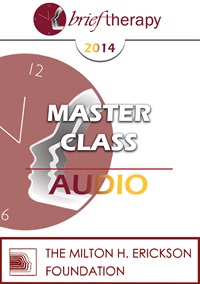
- Average Rating:
- Not yet rated
- Topic Areas:
- Ericksonian Psychotherapy | Master Classes | Brief Therapy | Ericksonian Hypnosis and Therapy Techniques | Experiential Therapy | Psychotherapy | Solution Oriented Approach
- Categories:
- Brief Therapy Conference | Brief Therapy Conference 2014 | Master Class
- Faculty:
- Jeffrey Zeig, PhD | Bill O'Hanlon, MS
- Duration:
- 5:51:06
- Format:
- Audio Only
- Original Program Date:
- Dec 15, 2014
- Short Description:
- Many schools of psychotherapy have been derived from the seminal work of Milton H Erickson M.D., including strategic therapy, interactional therapy, NLP and solution focused therapy. In some approaches hypnosis is central; in other approaches hypnosis is more peripheral. This class features two experts personally trained by Dr. Erickson, each of whom approach psychotherapy from somewhat different perspectives. In his approach, Possibility Therapy, Bill O'Hanlon epitomizes the strengths of a solution focused orientation. In his experiential approach, Jeffrey Zeig shades treatment in the direction of developing dramatic reference experiences.
- Price:
- $15.00 - Base Price
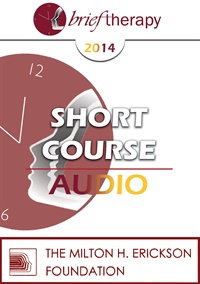
- Average Rating:
- Not yet rated
- Topic Areas:
- Ericksonian Psychotherapy | Psychotherapy | Trauma | Short Courses | Children and Adolescent Therapy | Pain and Healing | Brief Therapy | Ericksonian Hypnosis and Therapy Techniques
- Categories:
- Brief Therapy Conference | Brief Therapy Conference 2014
- Faculty:
- Maria Escalante de Smith, MA
- Duration:
- 1:09:29
- Format:
- Audio Only
- Original Program Date:
- Dec 11, 2014
- Short Description:
- When children experience painful emotions and anxiety after going through traumatic events they may not be able to understand what is happening to them and thus get depressed. Other consequences may appear, like lack of concentration or academic problems. Attendants will learn how treat these conditions by using brief Ericksonian techniques, assignments, and toys and by including the family members during therapy.
- Price:
- $15.00 - Base Price
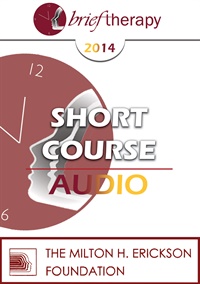
- Average Rating:
- Not yet rated
- Topic Areas:
- Short Courses | Somatic Experiences | Brief Therapy | Ericksonian Hypnosis and Therapy Techniques | Strategic Therapy
- Categories:
- Brief Therapy Conference | Brief Therapy Conference 2014
- Faculty:
- Hank Griffin, MA
- Duration:
- 1:30:29
- Format:
- Audio Only
- Original Program Date:
- Dec 11, 2014
- Short Description:
- Severe mental illness predominantly strikes the young, derailing normal social, cognitive and emotional development, predisposing to traumatic experience. Brief therapy interventions are particularly apt because they encourage skill acquisition and decontextualization via remedial experiential learning. This presentation will detail the use of strategic, somatic experiencing-influenced and Ericksonian interventions, among them pattern interruption, symptom prescription, ordeals and other Ericksonian elements treating chronically ill clients with attention to the structure and delivery of such interventions.
- Price:
- $15.00 - Base Price
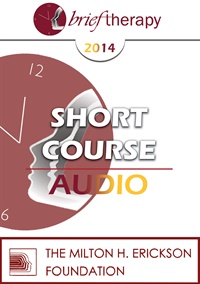
- Average Rating:
- Not yet rated
- Topic Areas:
- Short Courses | Hypnosis | Hypnotherapy | Self-Hypnosis | Ericksonian Hypnosis and Therapy Techniques | Anxiety | Depression | Post-Traumatic Stress Disorder (PTSD)
- Categories:
- Brief Therapy Conference | Brief Therapy Conference 2014
- Faculty:
- Paul Koeck, MD
- Duration:
- 1:37:58
- Format:
- Audio Only
- Original Program Date:
- Dec 11, 2014
- Short Description:
- Hypnotic Scaling is a simple Ericksonian & Solution Focused (self)hypnotic technique, developed by Paul Koeck, MD to help your client self-control and resolve Anxiety and Depression or symptoms of PTSD. You will be able to teach your client to freely choose where (s)he wants to be at a scale from 0 to 10 at any moment or in any context using (Self) Hypnotic Scaling. Your client will be able to choose his emotions, thoughts or feelings when and where (s)he wants!
- Price:
- $15.00 - Base Price
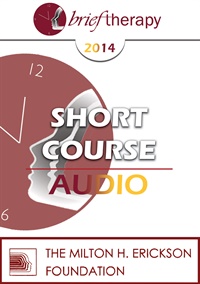
- Average Rating:
- Not yet rated
- Topic Areas:
- Trauma | Short Courses | Memory | Ericksonian Hypnosis and Therapy Techniques | Psychology
- Categories:
- Brief Therapy Conference | Brief Therapy Conference 2014
- Faculty:
- Dan Short, PhD
- Duration:
- 1:32:01
- Format:
- Audio Only
- Original Program Date:
- Dec 11, 2014
- Short Description:
- Ericksonian trauma work utilizes the experience of the present to redefine the past, while remaining future oriented. Memory reconsolidation occurs as memories are physically altered and re-encoded with new emotional elements. More than symptom relief, the intentional use of imagination and creative problem solving ensures greater resiliency for future challenges.
- Price:
- $15.00 - Base Price
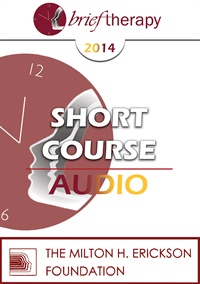
- Average Rating:
- Not yet rated
- Topic Areas:
- Anxiety | Depression | Trauma | Short Courses | Brief Therapy | Ericksonian Hypnosis and Therapy Techniques | Consciousness
- Categories:
- Brief Therapy Conference | Brief Therapy Conference 2014
- Faculty:
- Joseph Dowling, MS, LPC
- Duration:
- 1:27:36
- Format:
- Audio Only
- Original Program Date:
- Dec 11, 2014
- Short Description:
- Milton H. Erickson, M.D. understood that the conscious (thinking) mind is where symptoms are frequently created and cultivated while the subconscious mind is a limitless storehouse of healing energies, potentials, and solutions. This short course will describe a deceptively simple, Ericksonian approach to becoming powerfully calm. Live demonstrations, experiential zone exercises, and case studies will be facilitated to teach how solution-focused questions, strategic interventions, and formal/conversational hypnotherapy effectively treat anxiety, depression, and trauma.
- Price:
- $15.00 - Base Price
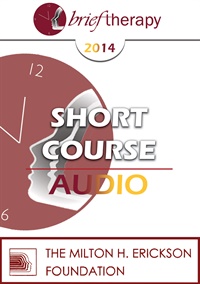
- Average Rating:
- Not yet rated
- Topic Areas:
- Anxiety | Depression | Trauma | Short Courses | Ericksonian Hypnosis and Therapy Techniques | Reality Therapy | Brief Therapy
- Categories:
- Brief Therapy Conference | Brief Therapy Conference 2014
- Faculty:
- Robert Wubbolding, EdD
- Duration:
- 1:29:28
- Format:
- Audio Only
- Original Program Date:
- Dec 11, 2014
- Short Description:
- A demonstration and a 12-minute DVD illustrate how to assist clients to make effective choices satisfying their needs, especially power or inner control. Merging reality therapy with Ericksonian principles helps clients discover and choose alternatives to the manifestations of past trauma, the pain of powerlessness due to anxiety and depression.
- Price:
- $15.00 - Base Price
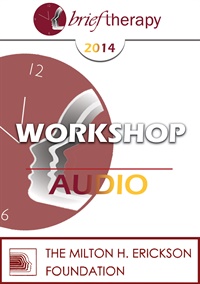
- Average Rating:
- Not yet rated
- Topic Areas:
- Anxiety | Depression | Trauma | Cognitive Behavior Therapy (CBT) | Hypnosis | Workshops | Ericksonian Hypnosis and Therapy Techniques | Milton Erickson | Brief Therapy | Naturalistic
- Categories:
- Brief Therapy Conference | Brief Therapy Conference 2014
- Faculty:
- Ernest Rossi, PhD | Kathryn Rossi, PhD | Roxanna Erickson Klein, RN, PhD, LPC, LCDC
- Duration:
- 1:59:16
- Format:
- Audio Only
- Original Program Date:
- Dec 12, 2014
- Short Description:
- Ernest Rossi, PhD, Roxanna Erickson-Klein and Kathryn Rossi review the case work of Milton H. Erickson, MD in counseling, psychotherapy, therapeutic hypnosis and rehabilitation as evidence-based cognitive behavior therapy to treat anxiety, depression and trauma. This experiential workshop explores the timeless nature of the work of Milton H. Erickson, who substantially influenced the manner that psychotherapy is practiced in the 21 century.
- Price:
- $15.00 - Base Price
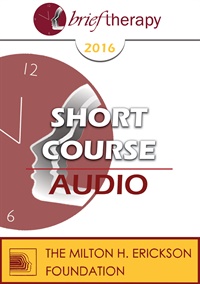
- Average Rating:
- Not yet rated
- Topic Areas:
- Short Courses | Utilization | Interviewing | Ericksonian Hypnosis and Therapy Techniques | Psychotherapy | Hypnosis
- Categories:
- Brief Therapy Conference | Brief Therapy Conference 2016
- Faculty:
- Brent Geary, PhD | Claudia Weinspach, Dipl. Psych
- Duration:
- 1:21:38
- Format:
- Audio Only
- Original Program Date:
- Dec 08, 2016
- Short Description:
- Milton Erickson’s counsel to “Take what the patient brings” encapsulated the utilization approach that he introduced in hypnosis and psychotherapy. This workshop is designed to enhance participants’ awareness of and ability to use the many facets of utilization that are elicited during clinical interviews. Two demonstrations will be included.
- Price:
- $15.00 - Base Price


